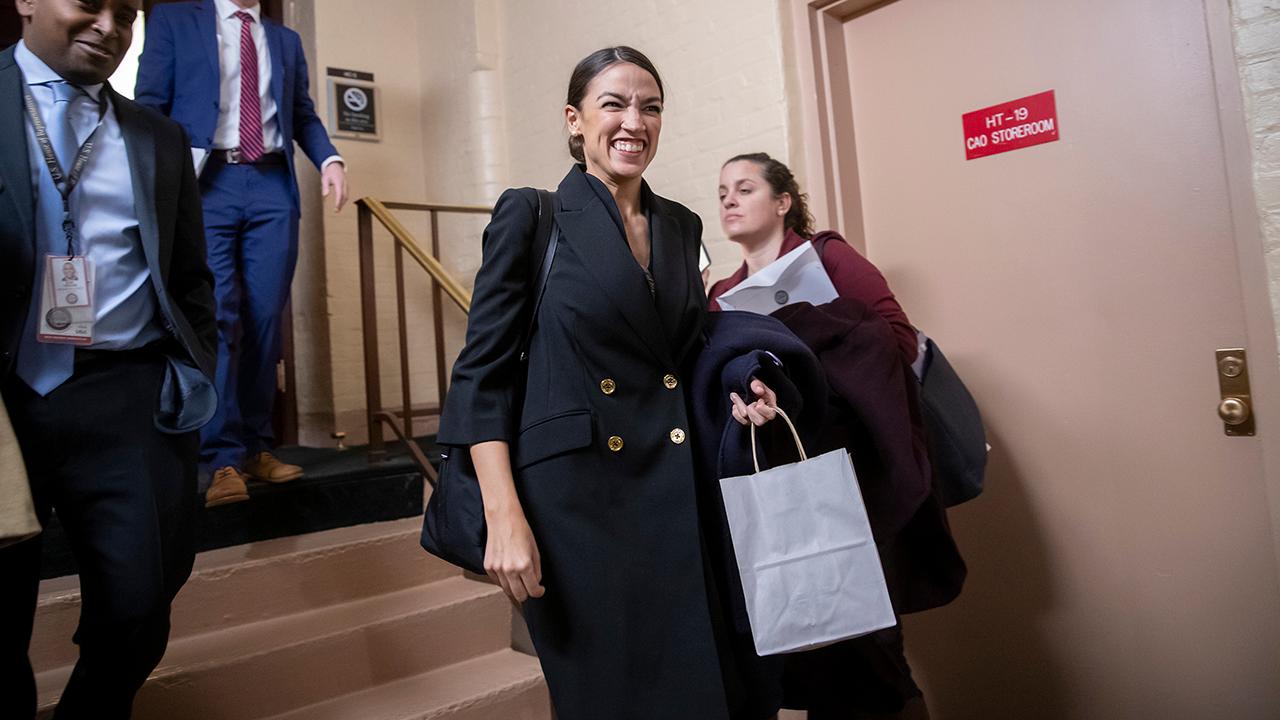Ocasio-Cortez’s ‘Green Deal’ could mean collateral damage for New York's La Guardia, other airports
An outline of a sweeping environmental legislative package unveiled on Thursday by Rep. Alexandria Ocasio-Cortez aims to reduce the need for air travel, a proposal that could have an impact on one of the nation’s largest airports that provides thousands of jobs to individuals within and around the Democrat’s New York district.
The so-called “Green New Deal,” which aims to eliminate greenhouse gas emissions by 2030, suggests expanding the high-speed rail to a “scale where air travel stops becoming necessary.”
Such a measure -- which could impact airports nationwide, including New York's LaGuardia Airport -- highlights the difficulty lawmakers have historically faced in advancing new environmental policies, given the prevalence of fossil fuel and other peripheral industries, including automotive, aviation and agriculture, in districts across the U.S. that could be affected by shifts in regulation.
Reducing airline travel, for example, could lower passenger traffic and, therefore, impact the financial performance of airports large and small.
In total, New York’s commercial airports, which includes LaGuardia, John F. Kennedy International, Newark Liberty International and New York Stewart International, flew 138 million passengers in 2018, a 3.8 percent increase.
LaGuardia -- based in Cortez’s district – employs 12,000 individuals directly and as many as 136,000 indirectly, totaling $6.8 billion in wages and $18.7 billion in economic activity for New York and New Jersey, according to data from the New York Port Authority.
A Cortez spokesperson did not respond to FOX Business' request for comment.
Environmental policy has historically been a difficult issue for lawmakers in both parties to navigate.
Push-back from the coal sector to the so-called Clean Power Plant rule led some Democrats, like Sen. Joe Manchin of West Virginia, to publicly blast one of former President Barack Obama’s signature achievements as an “assault” on the state’s economy. And the prevalence of coal facilities in deeply-conservative strongholds has helped solidify GOP resistance to various policy ideas. It also helped Trump, during his campaign, win the critical state of West Virginia.
A wide-ranging crackdown on fossil fuels, for example, could elicit backlash from the auto industry which -- while in the midst of a shift to electric vehicles -- still receives a substantial portion of annual earnings from the sale of SUVs and pickup trucks. Any regulatory changes that would force carmakers to accelerate the move to emissions-free cars could receive pushback from the industry and, subsequently, the lawmakers who oversee districts or states where the auto sector employs thousands of individuals.
| Ticker | Security | Last | Change | Change % |
|---|---|---|---|---|
| DAL | DELTA AIR LINES INC. | 75.00 | -0.35 | -0.46% |
| JBLU | JETBLUE AIRWAYS CORP. | 6.16 | -0.20 | -3.14% |
| AAL | AMERICAN AIRLINES GROUP INC. | 14.99 | -0.25 | -1.64% |
| LUV | SOUTHWEST AIRLINES CO. | 53.36 | -0.90 | -1.66% |
The resolution – which Ocasio-Cortez introduced alongside Democratic Sen. Ed Markey of Massachusetts – is far from becoming law and it remains unclear whether it has the backing of the party’s decision-makers.
House Speaker Nancy Pelosi said “nobody knows what it is.”
“It will be one of several or maybe many suggestions that we receive,” the California Democrat told Politico. “The green dream or whatever they call it, nobody knows what it is, but they’re for it right?”
CLICK HERE TO GET THE FOX BUSINESS APP
Still, it was immediately embraced by 2020 Democratic presidential candidates like Sens. Kamala Harris of California and Elizabeth Warren of Massachusetts, highlighting the need for White House hopefuls to back environmental policies that have become a litmus test for the party’s liberal base.




















